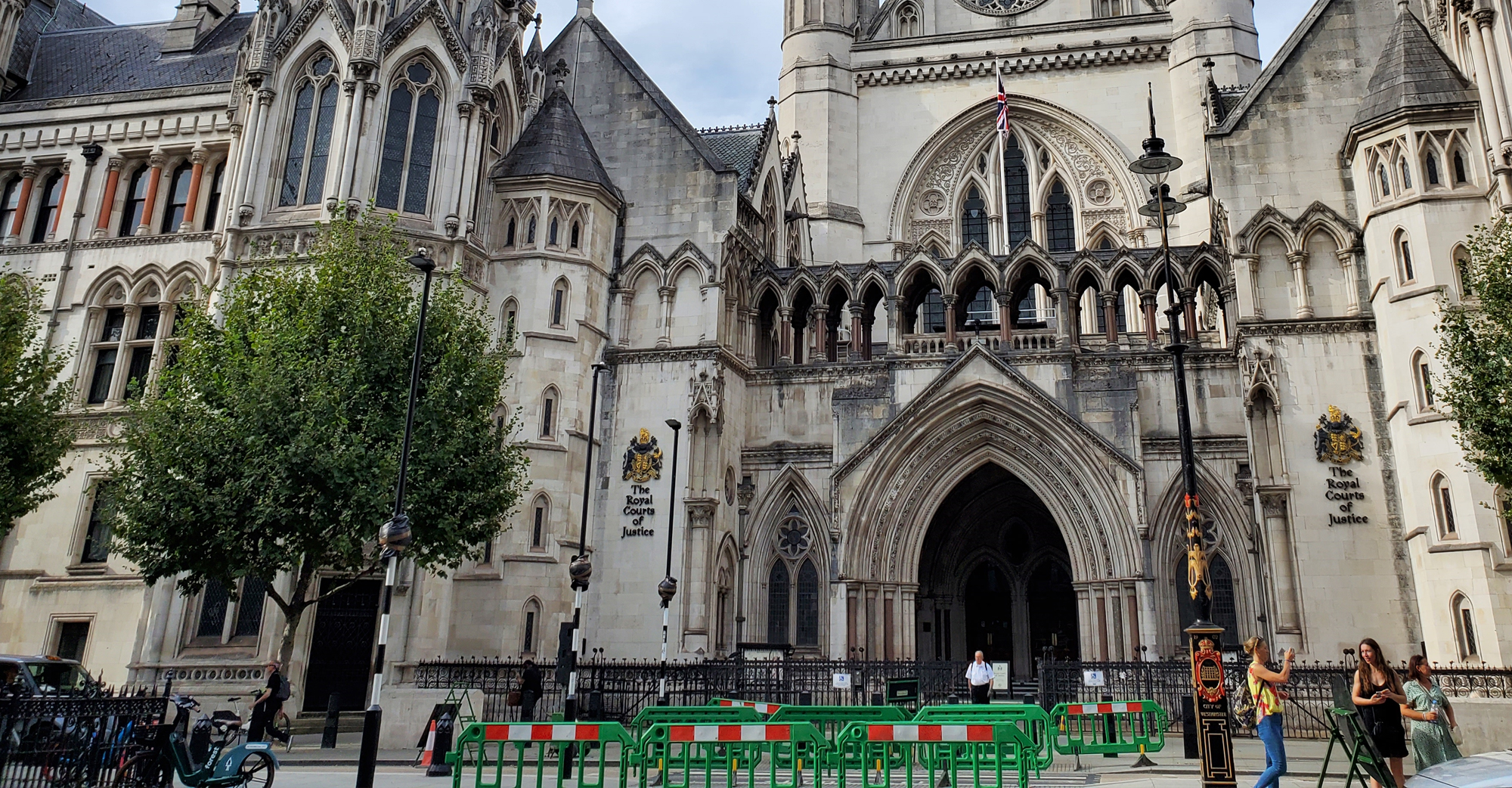Rutherford Birchard Hayes
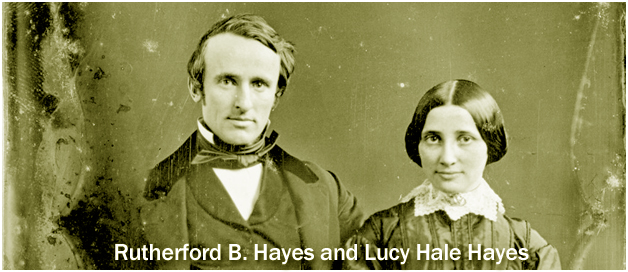 Rutherford B. Hayes and Lucy Hale Hayes in the 1850s. (Hayes Presidential Library).
Rutherford B. Hayes and Lucy Hale Hayes in the 1850s. (Hayes Presidential Library).
Rutherford Birchard Hayes (October 4, 1822 - January 17, 1893) was the 19th president of the United States, serving from 1877 to 1881. Hayes died of heart disease on January 17, 1893. A long funeral procession wound through the Ohio countryside, led by President-elect Grover Cleveland. Biographer Ari Hoogenboom has written that Hayes's greatest achievement was to restore popular faith in the presidency and reverse the deterioration of executive power that had established itself after the assassination of Abraham Lincoln in 1865. His supporters have praised his commitment to civil-service reform; his critics have derided his leniency toward former Confederate states. In retirement, Hayes was troubled by the disparity between the rich and the poor, saying in an 1886 speech, "Free government cannot long endure if property is largely in a few hands and large masses of people are unable to earn homes, education, and a support in old age."
Archduke Franz Ferdinand: Austria-Hungary
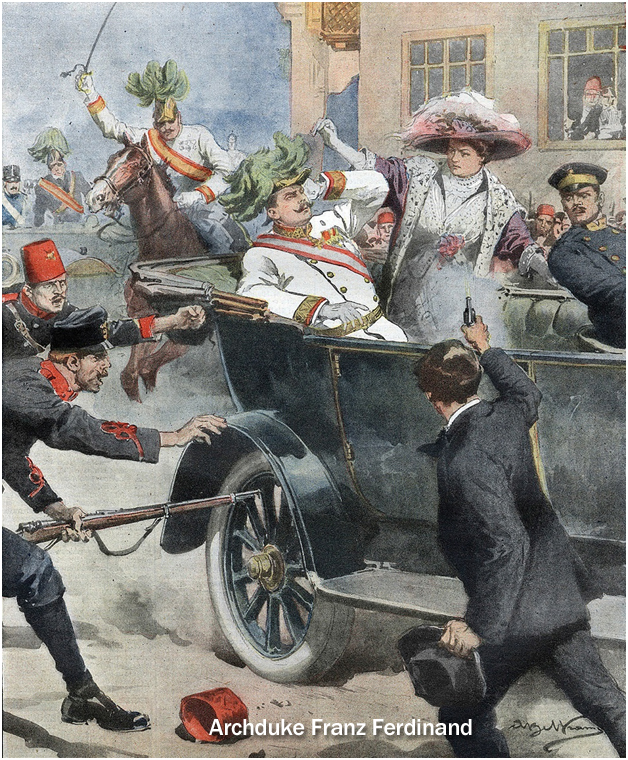 The assassination of Archduke Franz Ferdinand and Sophie, duchess of Hohenberg,that sparked World War One. Photograph of drawing courtesy of aspectsofhistory.com.
The assassination of Archduke Franz Ferdinand and Sophie, duchess of Hohenberg,that sparked World War One. Photograph of drawing courtesy of aspectsofhistory.com.
In June 1914, Austria-Hungary's Archduke Franz Ferdinand and his wife, Sophie, Duchess of Hohenberg, were assassinated by the Serbian nationalist Gavrilo Princip at Sarajevo, today the capital of Bosnia and Herzegovina.
A month later, World War I began with Austria's declaration of war against Serbia. Princip's act gave Austria-Hungary the excuse that it had sought for opening hostilities against Serbia and thus precipitated World War I. In the former Yugoslavia, Princip was regarded as a national hero. The total number of military and civilian casualties in World War I, was around 40 million. The total number of deaths includes 9.7 million military personnel and about 10 million civilians.
Indira Gandhi, Indian prime minister
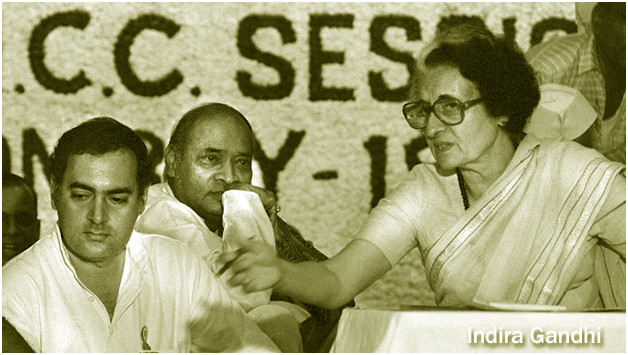 India's only female prime minister, Indira Gandhi. Photograph courtesy of sputniknews.
India's only female prime minister, Indira Gandhi. Photograph courtesy of sputniknews.
Indian prime minister Indira Gandhi was assassinated in 1984 at her residence in New Delhi. She was killed by her Sikh bodyguards. Gandhi's military operation was to remove Sikh militant Jarnail Singh Bhindranwale and other Sikh separatists from the Golden Temple of Harmandir Sahib in Amritsar, Punjab, the holiest site of Sikhism..
Gandhi's assassination led to the 1984 Sikh massacres which were instigated by political figures from the Indian National Congress, who orchestrated pogroms against Sikh populations throughout India. Four days of mob violence resulted in the destruction of 40 historic Gurdwaras and other important Sikh holy sites. Official Indian government figures put the death toll at 3,350 while other sources have quoted that between 8,000 to 16,000 Sikhs were killed.
William McKinley, US President
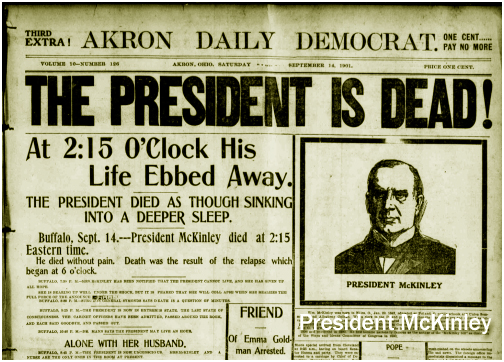 The death of President William McKinley as reported in the Akron Daily Democrat on September 14, 1901. Photograph courtesy of Akron Daily Democrat via tumblr.com.
The death of President William McKinley as reported in the Akron Daily Democrat on September 14, 1901. Photograph courtesy of Akron Daily Democrat via tumblr.com.
Following his inauguration in 1901, United States President William McKinley left Washington for a tour of the western states, to be concluded with a speech at the Pan-American Exposition in Buffalo, New York. Cheering crowds throughout the journey attested to McKinley's immense popularity. More than 50,000 admirers attended his exposition speech. The following day, September 6, 1901, while McKinley was shaking hands with a crowd of well-wishers at the exposition, Leon Czolgosz, an anarchist, fired two shots at the president's chest and abdomen. Rushed to a hospital in Buffalo, McKinley lingered for a week before dying in the early morning hours of September 14. He was the third American president to be assassinated, after Abraham Lincoln in 1865 and James A. Garfield in 1881. John F. Kennedy would follow in 1963.
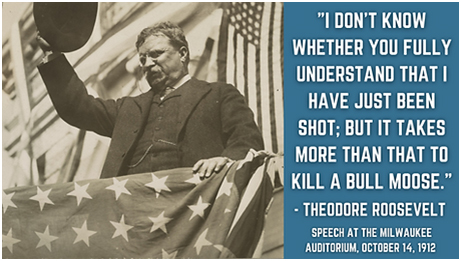
After McKinley's death, newly inaugurated President Theodore Roosevelt declared, "When compared with the suppression of anarchy, every other question sinks into insignificance." On October 14, 1912, Theodore Roosevelt, now a former US President, survived an assassination attempt while campaigning for the presidency in Milwaukee, Wisconsin, under his new progressive Bull Moose Party. The bullet lodged in Roosevelt's chest after penetrating his steel eyeglass case and passing through a 50-page-thick copy of his speech titled "Progressive Cause Greater Than Any Individual," which he was carrying in his jacket pocket.
Roosevelt concluded that since he was not coughing blood, the bullet had not reached his lung; he declined suggestions to go to the hospital immediately. Instead, he delivered his scheduled speech. His opening comments to the gathered crowd were, "Friends, I shall ask you to be as quiet as possible. I don't know whether you fully understand that I have just been shot - but it takes more than that to kill a Bull Moose."
Anwar Sadat, the 3rd President of Egypt
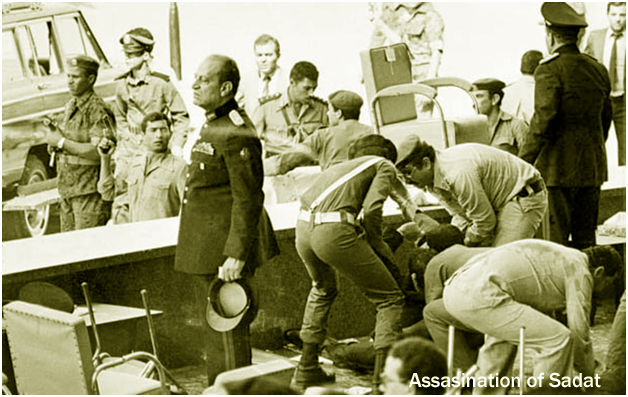 An Egyptian military officer contemplates the madness during the aftermath of the Anwar Al-Sadat assassination. Egyptian soldiers tend to the lifeless body of Sadat and those wounded on the platform. (Wikimedia)
An Egyptian military officer contemplates the madness during the aftermath of the Anwar Al-Sadat assassination. Egyptian soldiers tend to the lifeless body of Sadat and those wounded on the platform. (Wikimedia)
On October 6, 1981, Anwar Sadat, the 3rd President of Egypt, was assassinated during the annual victory parade held in Cairo to celebrate Operation Badr, during which the Egyptian Army had crossed the Suez Canal and taken back the Sinai Peninsula from Israel at the beginning of the Yom Kippur War. The assassination was undertaken by members of the Egyptian Islamic Jihad.
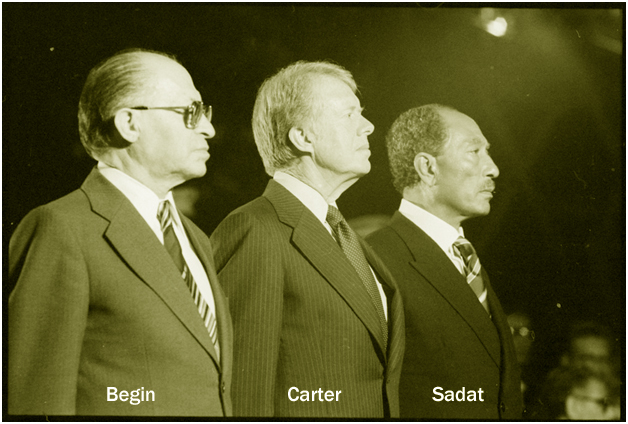 Menahem Begin, Jimmy Carter and Anwar Sadat at Camp David. Photograph courtesy of U.S. National Archives and Records. Administration.
Menahem Begin, Jimmy Carter and Anwar Sadat at Camp David. Photograph courtesy of U.S. National Archives and Records. Administration.
Sadat's assassination likely stemmed from Islamists who opposed Sadat's peace initiative with Israel and the United States relating to the Camp David Accords, signed by Sadat and Israeli Prime Minister Menachem Begin in September 1978, following twelve days of secret negotiations at Camp David, the country retreat of the President of the United States in Maryland. The two framework agreements were signed at the White House, witnessed by President Jimmy Carter. Due to the agreement, Sadat and Begin received the shared 1978 Nobel Peace Prize.
